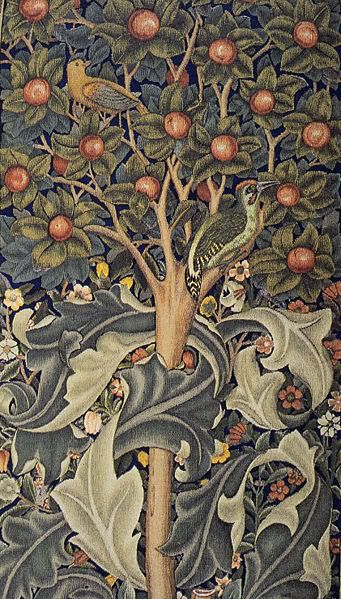The Arts and Crafts movement began in London, England in the 1860s. William Morris was one of the main founders of the movement. After reading the writings of John Ruskin, Morris became convinced that the medieval world was superior to the world of the post-Renaissance because it was more close to natural world. In his book The Stones of Venice (1853), Ruskin noted the connection between art, nature, and morality. Morris picked up on the idea and began to question the industrial revolution's mechanized production and the affect it had on artists.
In 1861, Morris founded the firm of Morris, Marshall, Faulkner & Co., later known as Morris and Company with his friends Dante Gabriel Rossetti, Burne-Jones, Ford Madox Brown and Philip Webb. The company worked at producing environmentally sensitive, nature inspired products that were intended to make the insides of homes exist in harmony with nature. Morris was particularly celebrated for the revival of tapestry weaving, producing beautiful works of art that seem straight from the pages of arthurian legend.
Morris was not only a splendid artist, but also an accomplished writer. The name of this site is taken from his most famous work, The Earthly Paradise. Morris founded Kelmscott Press in 1891. The press revived traditional handcrafted bookbinding and focussed on woodcuts and handcrafted fonts.
William Morris' work was ahead of its time. His most famous saying is "have nothing in your houses that you do not know to be useful or believe to be beautiful." His commitment to quality over quantity was a reaction to the excesses of Victorian society and remains appropriate for our own times. As the people gradually grow weary of the consumptive frenzy of our modern age, perhaps the Arts and Crafts movement will be revived.
If you would like to learn more, check out the William Morris Society Website http://www.morrissociety.org/
In 1861, Morris founded the firm of Morris, Marshall, Faulkner & Co., later known as Morris and Company with his friends Dante Gabriel Rossetti, Burne-Jones, Ford Madox Brown and Philip Webb. The company worked at producing environmentally sensitive, nature inspired products that were intended to make the insides of homes exist in harmony with nature. Morris was particularly celebrated for the revival of tapestry weaving, producing beautiful works of art that seem straight from the pages of arthurian legend.
Morris was not only a splendid artist, but also an accomplished writer. The name of this site is taken from his most famous work, The Earthly Paradise. Morris founded Kelmscott Press in 1891. The press revived traditional handcrafted bookbinding and focussed on woodcuts and handcrafted fonts.
William Morris' work was ahead of its time. His most famous saying is "have nothing in your houses that you do not know to be useful or believe to be beautiful." His commitment to quality over quantity was a reaction to the excesses of Victorian society and remains appropriate for our own times. As the people gradually grow weary of the consumptive frenzy of our modern age, perhaps the Arts and Crafts movement will be revived.
If you would like to learn more, check out the William Morris Society Website http://www.morrissociety.org/



No comments:
Post a Comment